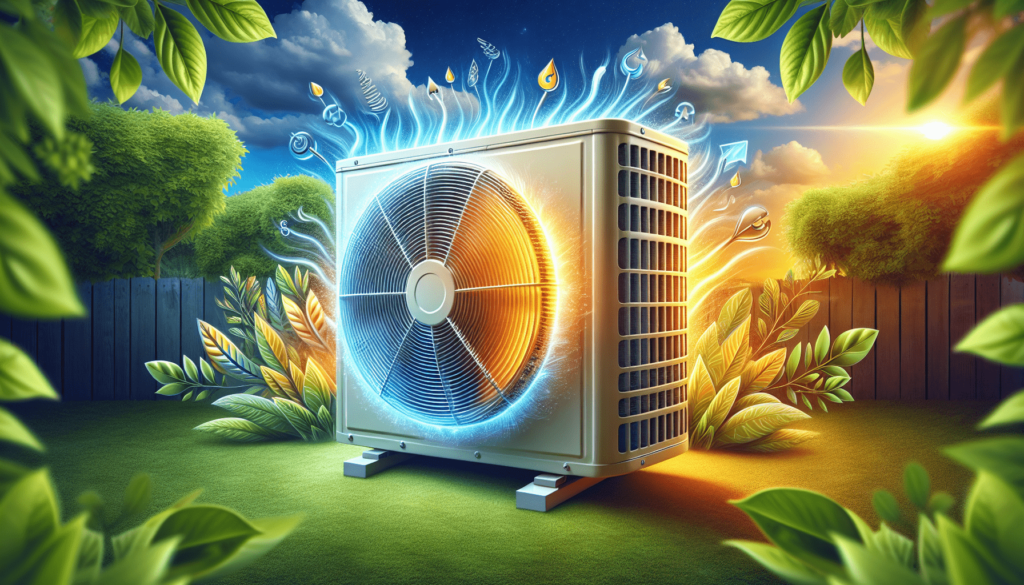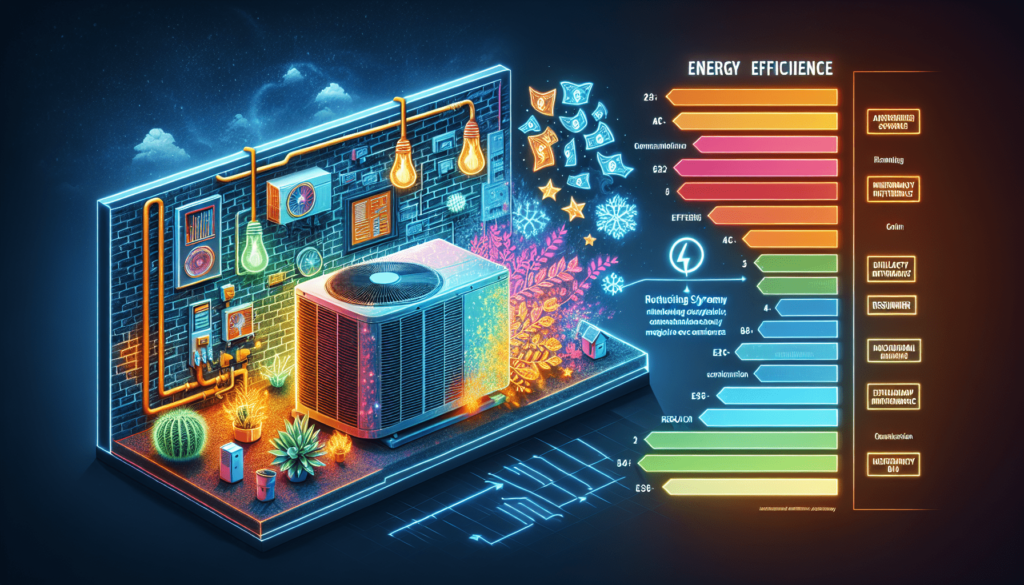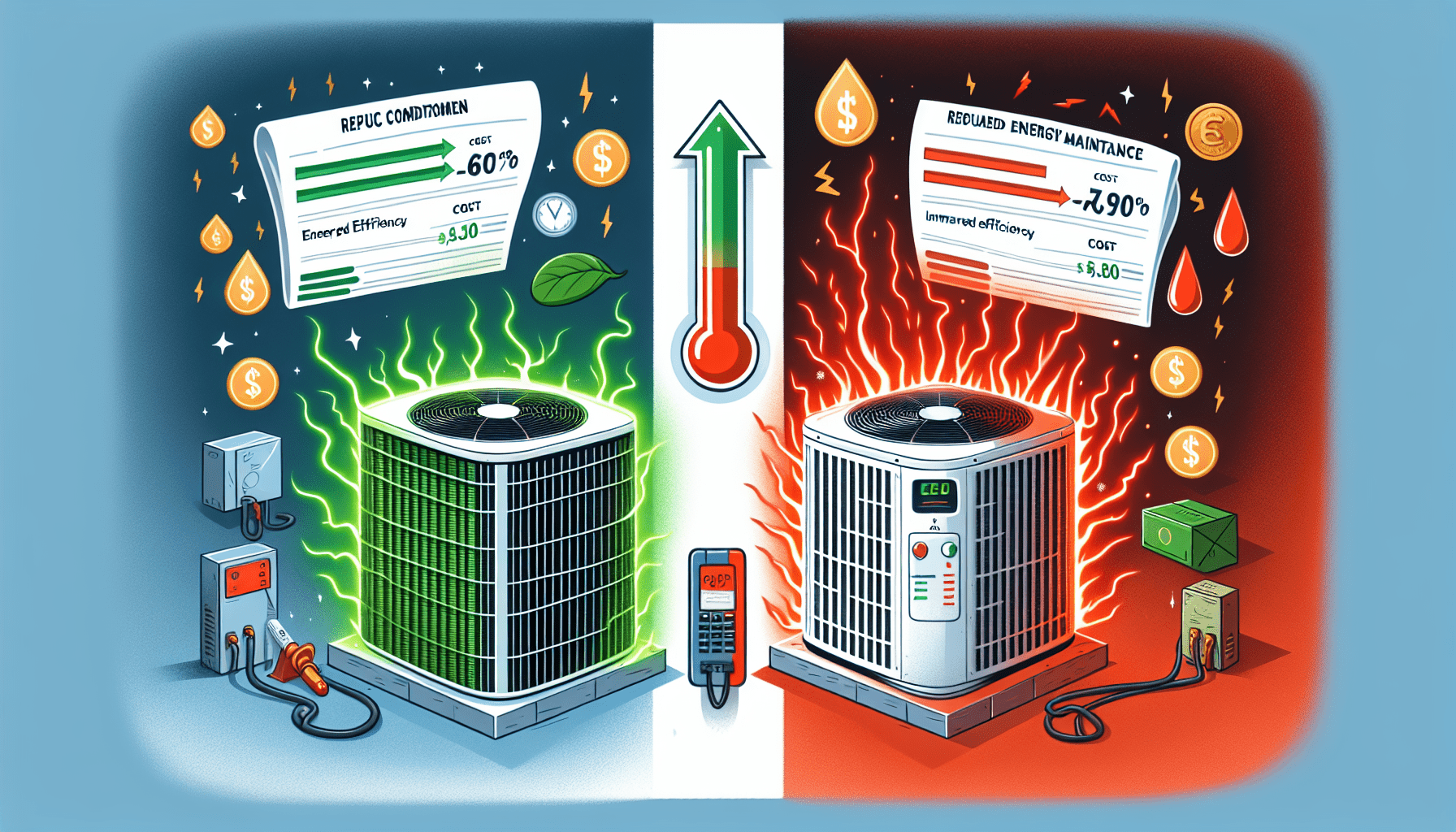Maintaining regular maintenance on your air conditioning system is crucial for ensuring optimum energy efficiency. By properly servicing your A/C unit, you not only prolong its lifespan but also prevent potential breakdowns and costly repairs. This article highlights the significance of regular A/C maintenance in achieving energy efficiency, providing valuable insights and practical tips to help you make the most out of your cooling system while reducing energy consumption and lowering utility bills.

Understanding Energy Efficiency
Defining Energy Efficiency
Energy efficiency refers to the ability to accomplish a desired level of performance while minimizing the consumption of energy. In simpler terms, it means using less energy to perform the same or even better task. When it comes to household energy efficiency, it involves optimizing the use of energy within the home to minimize waste and reduce utility bills. One of the key contributors to energy consumption in a household is the air conditioning (A/C) systems, which makes it crucial to understand their role in energy efficiency.
Importance of Energy Efficiency in a Household
Energy efficiency plays a vital role in households for several reasons. Firstly, it helps in reducing energy consumption, which ultimately leads to lower energy bills and cost savings for homeowners. By using energy more efficiently, households can significantly decrease their environmental impact, contributing to a greener and more sustainable future. Moreover, energy-efficient homes tend to be more comfortable, with a consistent indoor temperature and improved air quality. This creates healthier living conditions for the occupants and enhances their overall well-being.
How A/C Units Contribute to Total Energy Consumption
Among the various appliances and systems in a household, A/C units are known to be major contributors to energy consumption. Particularly during hot summer months, A/C systems work tirelessly to cool the indoor environment, resulting in significant energy usage. It’s estimated that air conditioning can account for up to 50% of a household’s total electricity consumption during peak cooling seasons. Therefore, understanding the role of A/C systems in energy efficiency is crucial for homeowners to effectively manage their energy consumption and costs.
The Role of A/C Systems in Energy Efficiency
Basics of How an A/C System Works
To comprehend how A/C systems contribute to energy efficiency, it’s essential to grasp the basics of how these systems work. At its core, an A/C system removes heat and humidity from the indoor air, providing a comfortable living environment. It does this by employing a refrigeration cycle that involves the evaporation and condensation of a refrigerant gas. The evaporator coil absorbs heat from the indoor air, while the condenser coil releases it to the outdoors. This continuous cycle ensures the desired cooling effect.
A/C Systems and Their Energy Consumption
A/C systems consume energy primarily through the operation of their compressor, which compresses the refrigerant gas to increase its temperature. The compressor requires a significant amount of energy to function properly and maintain the desired cooling effect. In addition to the compressor, other components such as the fans, motors, and controls also consume energy during the cooling process. The overall energy consumption of an A/C system is influenced by various factors, including the size of the unit, its efficiency rating, and the duration and frequency of usage.
Impact of Inefficient A/C Systems on Energy Bills
Inefficient A/C systems can have a detrimental impact on energy bills. When an A/C system is not well-maintained or is outdated, it tends to consume more energy than necessary to deliver the desired cooling. Inefficient systems often struggle to maintain the set temperature, resulting in longer and frequent cycles, which increases energy consumption. Moreover, worn-out components and inadequate insulation can further hinder energy efficiency. As a result, homeowners with inefficient A/C systems may experience higher energy bills without enjoying the expected level of comfort.
Indicators of an Inefficient A/C System
Increased Energy Bills
One significant indicator of an inefficient A/C system is a sudden increase in energy bills without a corresponding change in usage patterns. If you notice a significant spike in your energy bills despite using the A/C system as usual, it may be a sign that your A/C unit is consuming more energy than necessary. Monitoring your energy bills can help identify potential energy efficiency issues with your A/C system.
Inconsistent Room Temperatures
Another indication of an inefficient A/C system is inconsistent room temperatures throughout your home. If certain rooms remain uncomfortably warm while others are excessively cool, it may suggest that your A/C system is struggling to distribute cooling evenly. This imbalance in temperature distribution can be a result of poor maintenance or inadequate sizing of the A/C unit, leading to reduced energy efficiency.
Frequent Breakdowns
Frequent breakdowns and malfunctions in your A/C system can also be a sign of inefficiency. When components within the system are worn-out or not functioning optimally, the unit may require more energy to operate and maintain the desired cooling effect. These additional energy demands can increase the risk of breakdowns and costly repairs, further jeopardizing the energy efficiency of the system.
Excessive Noise from the Unit
Unusual or excessive noise coming from your A/C unit is another red flag that should not be ignored. Noisy operation may indicate issues such as worn-out or misaligned components, which can hinder the system’s energy efficiency. If your A/C unit is noticeably louder than before, it is advisable to have it inspected and serviced promptly to prevent potential energy waste.
Benefits of Regular A/C Maintenance
Preventing Breakdowns and Repairs
One of the primary benefits of regular A/C maintenance is the prevention of breakdowns and the need for costly repairs. By scheduling routine maintenance, you can ensure that your A/C system is inspected, cleaned, and serviced regularly. This proactive approach allows potential issues to be identified and resolved early on, before they escalate into major problems. By preventing breakdowns, you can minimize the risk of unexpected expenses and discomfort during hot summer months.
Improving Energy Efficiency
Regular A/C maintenance plays a crucial role in improving the energy efficiency of your cooling system. During maintenance visits, technicians clean and lubricate various components, ensuring they operate optimally. They also check and adjust refrigerant levels, ensuring that the system does not overwork or underperform. With proper maintenance, an A/C system can achieve its intended efficiency levels, resulting in lower energy consumption and reduced energy bills.
Extending A/C Unit Lifespan
A well-maintained A/C unit is likely to have a longer lifespan compared to one that is neglected. Regular maintenance helps keep the various parts and components of the system in good condition, preventing premature wear and tear. This extends the lifespan of the A/C unit, allowing homeowners to maximize their investment and avoid the expense of premature replacement. By prolonging the lifespan of your A/C unit, you not only save on replacement costs but also contribute to reducing waste and environmental impact.
Enhancing Air Quality
A properly maintained A/C system can significantly improve indoor air quality. During routine maintenance, technicians clean the system’s filters and coils, removing accumulated dust, dirt, and other airborne contaminants. This helps prevent the recirculation of pollutants, ensuring that the air circulating in your home is clean and healthy. Improved air quality can benefit everyone in your household, particularly those with allergies or respiratory conditions.

Common A/C Maintenance Procedures
Routine Inspection
Routine inspections are a fundamental part of A/C maintenance. During these inspections, technicians thoroughly examine your A/C system, checking for any signs of wear, damage, or potential issues. They assess the condition of various components, including the compressor, fans, motors, and controls. By identifying and addressing issues early on, routine inspections help prevent larger problems and maintain the optimal performance of the A/C system.
Cleaning or Replacing Filters
Cleaning or replacing the A/C filters is an essential maintenance procedure. Over time, filters can become clogged with dust, dirt, and other debris, restricting airflow and reducing the system’s efficiency. During maintenance visits, technicians clean or replace the filters, ensuring that the A/C system can operate with maximum efficiency. Regular filter maintenance not only improves energy efficiency but also enhances indoor air quality.
Cleaning Coils and Condensate Drain
Cleaning the coils and condensate drain is another crucial maintenance procedure. Over time, the evaporator and condenser coils can accumulate dust and dirt, diminishing their heat transfer capabilities. Technicians clean the coils during maintenance visits, ensuring efficient heat exchange and optimal cooling performance. Additionally, they inspect and clean the condensate drain to prevent clogs, which can lead to water backup and potential damage to the system.
Checking Coolant and Recharging
Maintaining proper refrigerant levels is vital for the effective operation of an A/C system. Technicians check the coolant levels during maintenance visits, ensuring that they are within the manufacturer’s specified range. If the levels are low, they may recharge the coolant to restore optimal performance. Proper coolant levels help the A/C system maintain the desired cooling effect without overworking the compressor, maximizing energy efficiency.
Professional A/C Maintenance
When to Consider Professional Maintenance
It is recommended to seek professional A/C maintenance at least once a year. Ideally, homeowners should schedule professional maintenance before the start of the cooling season to ensure optimal performance throughout the summer months. However, if you experience any of the indicators of an inefficient A/C system mentioned earlier, it is advisable to seek professional maintenance promptly. Professional technicians have the expertise and tools to identify and address any issues, improving your A/C system’s energy efficiency.
What to Expect from Professional Services
When opting for professional A/C maintenance, you can expect a comprehensive service that covers all necessary aspects of system upkeep. A trained technician will conduct a thorough inspection of your A/C system and perform all required maintenance procedures, including cleaning or replacing filters, lubricating components, cleaning coils, and checking refrigerant levels. They will also identify any potential issues and provide recommendations for repairs or upgrades, ensuring your A/C system operates efficiently.
Choosing a Reputable A/C Maintenance Company
When selecting a professional A/C maintenance company, it is crucial to choose a reputable and reliable provider. Consider factors such as the company’s experience, certifications, and customer reviews. Additionally, ensure that the company offers comprehensive maintenance services tailored to your specific A/C system. By choosing a reputable company, you can have peace of mind knowing that your A/C system is in capable hands and will be properly maintained for optimal energy efficiency.

DIY A/C Maintenance Tips
Basic Cleaning
While professional maintenance is recommended, homeowners can also perform some basic cleaning procedures to contribute to their A/C system’s maintenance. Regularly inspect and clean the area surrounding the outdoor unit, removing any debris or vegetation that may obstruct airflow. Additionally, ensure that the indoor vents and registers are clean and unobstructed, allowing for efficient air circulation.
Testing Your A/C System
Performing periodic tests on your A/C system can help identify potential issues and prevent energy waste. Test the system by turning it on and monitoring its performance. Take note of any unusual sounds, odors, or inconsistencies in cooling. If you notice any abnormalities, it may indicate a need for professional maintenance or repairs.
Checking and Replacing Filters
Checking and replacing filters is a simple yet crucial DIY maintenance procedure. Regularly inspect your A/C system’s filters and clean or replace them as needed. Follow the manufacturer’s recommendations for filter cleaning or replacement intervals to ensure proper airflow and optimal energy efficiency.
What to Avoid in DIY Maintenance
While basic DIY maintenance can contribute to the upkeep of your A/C system, it is important to avoid certain tasks that are best left to professionals. Avoid attempting to service or repair complex components or systems if you lack the necessary knowledge and expertise. Improper maintenance can potentially void warranties, cause further damage, or even pose safety risks. When in doubt, always consult a professional technician for guidance and assistance.
A/C Maintenance Schedules
Recommended Maintenance Frequencies
Maintaining a regular A/C maintenance schedule is essential for optimal energy efficiency. Most experts recommend scheduling professional maintenance at least once a year, ideally before the start of the cooling season. However, it may be beneficial to consider additional maintenance visits for specific A/C systems or households with higher usage or unique environmental factors. Consult with a professional technician to determine the best maintenance frequency for your specific A/C system.
Seasonal Considerations for A/C Maintenance
Seasonal changes can impact the performance and energy efficiency of your A/C system. Before the cooling season begins, it is advisable to schedule maintenance to ensure that your A/C system is in top condition. During this visit, technicians can address any issues that may have arisen during the winter months and prepare the system for the upcoming summer demands. Regular maintenance during the cooling season can also help identify and address any emerging issues promptly.
Keeping a Maintenance Log
Keeping a maintenance log can be a helpful practice to track and document A/C maintenance activities. Note down the dates of professional maintenance visits, DIY tasks performed, and any issues or concerns observed. This log serves as a valuable reference to monitor the frequency of maintenance, identify patterns or recurring issues, and provide a history of maintenance for future reference or when selling the property.

Advanced A/C Features for Energy Efficiency
Variable Speed Motors
Variable speed motors are advanced features that help enhance energy efficiency in A/C systems. Unlike single-speed motors that operate at a constant speed, variable speed motors can adjust their speed based on the cooling demands. This allows the A/C system to run at lower speeds when cooling requirements are lower, resulting in reduced energy consumption and increased overall efficiency.
Thermal Expansion Valves
Thermal expansion valves (TXVs) are another advanced feature that contributes to energy efficiency. TXVs regulate the flow of refrigerant into the evaporator coil based on the cooling load. By controlling the refrigerant flow more precisely, TXVs ensure that the A/C system operates at optimal efficiency levels, reducing energy waste and improving overall performance.
Improved Insulation and Sealing
Improved insulation and sealing in A/C systems can significantly enhance energy efficiency. Properly insulated and sealed ductwork prevents the loss of cooled air, ensuring that it reaches the intended areas efficiently. Similarly, well-insulated A/C units and properly sealed connections prevent unnecessary heat exchange and maintain optimal cooling performance.
The Future of Energy-efficient A/C Systems
Emerging Technologies for Energy Efficiency
The future of energy-efficient A/C systems looks promising, with ongoing advancements in technology. New technologies such as smart thermostats, which allow homeowners to control and optimize cooling settings remotely, can contribute to energy efficiency. Additionally, there is ongoing research and development focused on using alternative refrigerants with lower environmental impact, such as hydrofluoroolefins (HFOs), to improve overall system efficiency.
Government Policies and Incentives for Energy-efficient A/C Systems
Government policies and incentives can also drive the adoption of energy-efficient A/C systems. Many countries and regions have implemented energy efficiency regulations, setting minimum efficiency standards for A/C systems. Governments may also offer incentives, such as tax credits or rebates, to encourage homeowners to invest in energy-efficient A/C systems. These policies and incentives play a vital role in promoting energy efficiency and shaping the future of A/C systems.
The Role of Renewable Energy in A/C Systems
Renewable energy sources, such as solar power, have the potential to revolutionize the energy consumption of A/C systems. By harnessing clean and renewable energy, homeowners can reduce reliance on fossil fuels and minimize their environmental impact. Integrating A/C systems with renewable energy sources can empower homeowners to achieve even higher levels of energy efficiency and sustainability.
In conclusion, regular A/C maintenance is essential for achieving and maintaining energy efficiency in households. Understanding the role of A/C systems in energy consumption, recognizing the indicators of an inefficient system, and prioritizing professional and DIY maintenance procedures can significantly improve energy efficiency and reduce utility bills. With the advancements in technology and the growing focus on renewable energy, the future of energy-efficient A/C systems looks promising, offering homeowners greater control over their energy consumption and a greener, more sustainable future.

